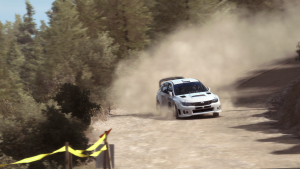When memorizing a game’s content becomes a requirement
During my ongoing literature review I often discover interesting facts about things I’ve never thought about. Sometimes I can connect these facts with my own observations: The result is mostly a completely new idea why things are as they are. Maybe these ideas are new to you, too. Therefore I’ll share my new science based knowledge with you!
This week: This time, I think about DiRT Rally and the imbalance that starts to evolve when the game is played over a longer period and players start to memorize the game’s content.
Normally, I enjoy pointing out the positive effects of playing computer games. Amongst other things, computer games challenge and hence train our abilities or help us to learn new knowledge. In addition, computer games are highly immersive and engaging environments that keep us motivated even if we are about to tackle a very difficult or repetitive task. The increased motivation to continue playing a game also results in an increased repetition of the game’s knowledge thus leading to a better learning outcome.

DiRT Rally
However, in case of DiRT Rally, the automatic training effects work a bit against the concept of the game. DiRT Rally is an authentic rally simulation and challenges the players with a realistic off-road driving experience. In contrast to circuit racing, rally drivers do not practice a rally stage until they have completely memorized it. Instead, they basically see every turn only once during a rally event.
Unfortunately, DiRT Rally features only a limited amount of rally stages and, as a result of this, players start to automatically memorize the stages while playing the game. Although this is another great example for the positive effects of playing computer games, it slowly takes away the excitement of the game. Personally, I am far away from memorizing all the stages available in DiRT Rally, but I already start to remember certain sections of some of the stages and once I approach them, I exactly know what is ahead of me. This knowledge ultimately helps me to drive more aggressive and faster than I would normally do.
There is, however, also a downside of this automatic learning effect which can become a problem once the game is played with other players. Normally, the amount of time a game is played is not the critical factor when it comes to multiplayer racing events. It is more about a player’s skill and ability to keep a car under control when driven at its limits. However, in the case of DiRT Rally, having remembered a stage gives a huge advantage over those players who are at the same skill level but who have not memorized a stage as they have to drive much more careful.
In the end, DiRT Rally successfully demonstrates how computer games help us to learn new knowledge due to a constant repetition. Unfortunately, from the point of view of a player, it is really sad that memorizing the content of a game seems to become necessary in order to stay competitive, especially when the game is all about seeing every corner only once. It would be very interesting if DiRT Rally would receive a random track generator that greatly reduces the effects of memorizing a stage.